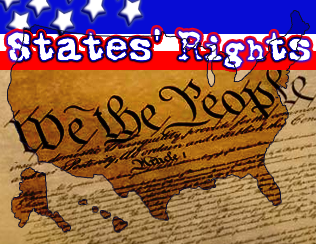Bill of Rights
Spencer Gallimore

Introduction
Deciding to put the Bill of Rights
into the Constitution was the main political compromise in the creation of the
United States government. Even though Federalists believed that individual
rights were fully protected by state and common law; they knew that Anti-Federalists
would never agree with the new Constitution until amendments protecting
specific rights were added. So in 1789 Congress passed proposed amendments to
the Constitution. The first ten amendments are now known as the Bill of Rights.
The Articles of the Confederation failed because of its many weaknesses
including congress did not have the power to tax or regulate foreign and
interstate commerce, there was not executive branch to enforce any acts passed
by congress, there was no national court system, and many other failures. As
the weaknesses became apparent, people began asking for changes to the Articles
that would create a stronger government. Later, a meeting was set in
Philadelphia. This became the Constitution Convention.
Amendment I (1)
Congress shall make no law respecting an establishment of religion, or prohibiting the free exercise thereof; or abridging the freedom of speech, or of the press, or the right of the people peaceably to assemble, and to petition the Government for a redress of grievances.
Freedom of speech, press, religion, and petition
AMENDMENT II (2)
A well regulated Militia, being necessary to the security of a free State, the right of the people to keep and bear Arms, shall not be infringed.
Right to bear arms.
Amendment III (3)
No Soldier shall, in time of peace be quartered in any house, without the consent of the Owner; nor in time of war, but in a manner to be prescribed by law.
Conditions for housing soldiers
AMENDMENT IV (4)
The right of the people to be secure in their persons, houses, papers, and effects, against unreasonable searches and seizures, shall not be violated, and no Warrants shall issue, but upon probable cause, supported by Oath or affirmation, and particularly describing the place to be searched, and the persons or things to be seized.
Right of search and seizure controlled
AMENDMENT V (5)
No person shall be held to answer for a capital, or otherwise infamous crime, unless on a presentment or indictment of a Grand Jury, except in cases arising in the land or naval forces, or in the Militia, when in actual service in time of War or public danger; nor shall any person be subject for the same offence to be twice put in jeopardy of life or limb; nor shall be compelled in any criminal case to be a witness against himself; nor be deprived of life, liberty, or property, without due process of law; nor shall private property be taken for public use without just compensation.
Changes concerning prosecution
AMENDMENT VI (6)
In all criminal prosecutions, the accused shall enjoy the right to a speedy and public trial, by an impartial jury of the State and district wherein the crime shall have been committed; which district shall have been previously ascertained by law, and to be informed of the nature and cause of the accusation; to be confronted with the witnesses against him; to have compulsory process for obtaining witnesses in his favor; and to have the assistance of counsel for his defence.
Right to a speedy trial and the right to a witness

AMENDMENT Vii (7)
In Suits at common law, where the value in controversy shall exceed twenty dollars, the right of trial by jury shall be preserved, and no fact tried by a jury shall be otherwise reexamined in any Court of the United States, than according to the rules of common law.
Right to a trial by jury
AMENDMENT viii (8)
Excessive bail shall not be required, nor excessive fines imposed, nor cruel and unusual punishments inflicted.
Excessive bail and cruel punishment
AMENDMENT ix (9)
The enumeration in the Constitution of certain rights shall not be construed to deny or disparage others retained by the people.
Rule of construction of the constitution
AMENDMENT X (10)
The powers not delegated to the United States by the Constitution, nor prohibited by it to the States, are reserved to the States respectively, or to the people.
Rights of the states under the Constitution







